Although spraying is a natural behaviour for cats, when they spray inside it is extremely unpleasant for everyone else in the home.
Spraying is a form of scent marking and the behaviour is actually one of the common reasons many cats end up in shelters, fortunately there are ways you can dissuade your cat from spraying indoors.

Cats usually spray outside so when they bring this behaviour inside it is a sign that something is causing them anxiety. In this situation, spraying is used by your cat as a way of making themselves feel more secure so it is important not to respond by shouting or telling them off.
You can stop your cat from spraying by identifying what is causing them to feel anxious and then take the relevant steps to make them feel more secure at home.
Contents
Top Tips to Stop Your Cat Spraying:
- Do not tell your cat off.
- Identify the reason for the scent marking.
- Remove all of the scent present where spraying has occurred.
- Help your cat feel secure at home.
- Use a cat training program.
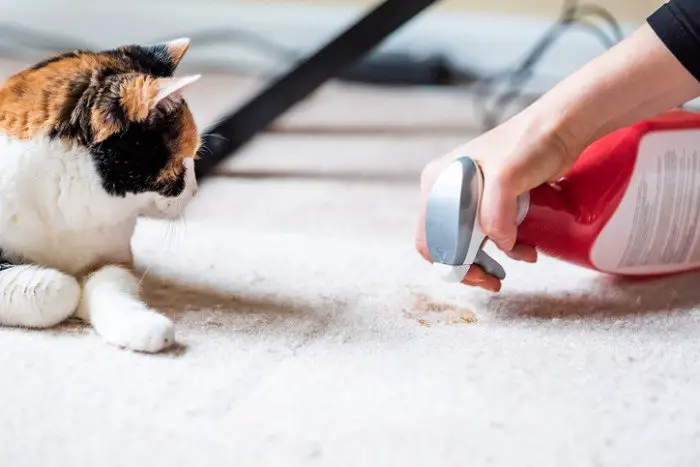
Before we get into the dos and do not’s of dealing with cat spraying, it is important to first identify whether your cat is spraying or urinating as there is a big difference.
If your cat is urinating it is to relieve a full bladder and urinating in a place that is not their litter tray may be a sign of a health problem.
When a cat is urinating, they will squat on a flat surface such as a bed, sofa or carpet and release a volume of urine.
Also Read: 8 Simple Ways To Get Cat Hair Out Of Your Carpet
When a cat is spraying they will stand upright, facing away from a vertical surface such as a wall, door, cupboard or curtain and spray a small amount of urine backwards while their tail is upright and often quivering.
You will often be able to see where your cat has sprayed and the odour of spray is far more pungent than regular urine.
If your cat is urinating indoors it may be a sign of old age, fear, problems with the litter tray (location, type of litter, type of tray, cleanliness etc.) or a health problem such as a urinary tract disease.
What is Spraying?
When a cat sprays they are scent marking with a mixture of urine and pheromones. The smell of spray is stronger than regular urine because of the additional aspects that are present for communication purposes.
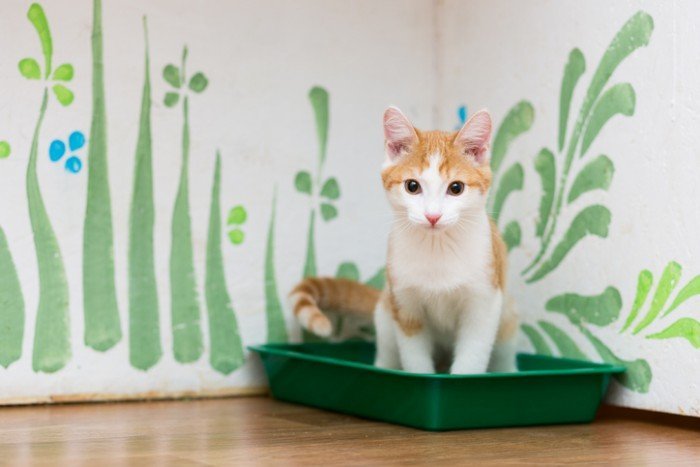
Although humans may think it is disgusting for a cat to be spraying, it is simply an instinctual behaviour that would play a very important role for cats in the wild, spraying is vital for communication and can be used as a way of marking territory and attracting mates.
Despite the strong smell which can suggest a large amount of urine has been passed, spraying is just a small amount of very pungent liquid so your cat should still be using the litter box as usual for urinating in.
Do Not Tell Your Cat Off
Now that you know your cat is spraying indoors, the first thing is to not tell your cat off. Although you may be tempted to vocalise your discontent at their behaviour, it is better if you don’t. Disciplining a cat doesn’t work.
Remember that your cat is spraying because they feel stressed or anxious.
This means if you are negative towards them during this time, it could cause the problem to worsen. Instead of getting mad at your cat, identify the reason for the behaviour and help to make them feel more secure.
Identify the Reason for the Scent Marking
There are several scenarios that may have caused your cat to start spraying inside the house, below are some of the most likely causes:
- As you probably already know, cats are very sensitive to their surroundings. Any changes to their environment can upset them, if you have brought anything new into your home (for example a new family member or new furniture) or have recently moved house this could be the reason for your cats spraying.
- A male cat who has not been neutered will spray more often than neutered cats, this is because it is used as a way of communicating with potential mates (although neutering will considerably reduce the likelihood of spraying if this is the cause it is important to note that spraying is seen in neutered and unneutered male cats as well as spayed and whole female cats).
- If you have more than one cat, or have recently gained or lost a pet, your cat may be feeling insecure and out of place which is causing them to spray in the house – read our article on how to introduce cats for tips on ways to do it that avoids making either cat feel insecure.
- If there are animals in the neighbourhood that tend to come into your garden or come close to your property, your cat may feel intimidated and spraying could be their way of trying to mark their territory and keep rivals away. The location of the spraying may give you clues as to the reason, in this case spraying near doors and windows may be a sign that the stress is being caused by something that is outside.
- Make sure you take your cat to the vet if you are not sure what is causing their spraying. Ruling out a medical issue is very important as your cat may be in discomfort or pain. A vet will also be able to advise on further steps you can take to stop the behaviour.
Although it may take a bit of patience and investigation work, finding out which of your cats (if you have more than one) is spraying, where and even when they are spraying it will help you to figure out the root cause of the problem.

For example, if your cat is spraying in hallways it could be because this is where they are coming into contact with your other cats and it is causing them to feel anxious, or if you see your cat spraying on new furniture or in a newly decorated room it is likely because the room smells different and unfamiliar.
Remove All of the Scent Present
Removing all of the scent that has been left by a cat spraying can be a challenge (Read this article for in-depth advice on completely removing the smell of cat pee), more often than not soap and water is not enough to take away the smell.

Keep in mind that a cat has a far stronger sense of smell than a human so even if you cannot smell anything anymore, your cat may still be able to detect it. Unfortunately, a cat will keep returning to areas that already smell like urine to spray.
Using an enzymatic neutralizer may be effective in neutralizing the area and will deter your cat from continuing to spray in the area.
When cleaning, it is best to avoid using bleach or ammonia-based cleaning products as these may inadvertently stimulate your cat to spray more.
You can make the areas your cat usually sprays inaccessible or more unattractive for your cat to further deter the behaviour and get them out of the habit of spraying. You can also reduce their feelings of anxiety by giving them cat treats and playing with them in these areas.
Another way you can reduce your cat’s anxiety is by using artificial pheromones in the areas your cat sprays as these will make your cat feel more relaxed.
The synthetic pheromones mimic those that are produced by cats when they are comfortable so using them will help to reduce stress and reassure your cat.
Help Your Cat Feel Secure
If you have ruled out health problems and have an idea of what is causing your cats spraying behaviour you can take steps to make them feel more secure.
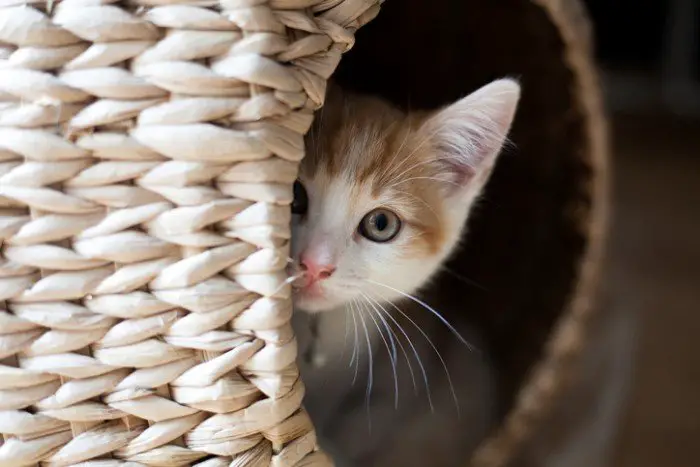
Think of spraying as a symptom, there is something else (externally) causing it and that is what we need to ultimately deal with. This is why just cleaning the area where your cat sprayed isn’t enough to stop them from doing it again.
- If you think your cat is spraying because of environmental changes such as new furniture, you can:
Keep your cat away from the altered rooms for a few days while the new smells mingle with the scents already in the house. - Make a new item more familiar by rubbing a clean cloth on your cat’s neck to collect scent, then dab the cloth on areas of the new item to spread your cat’s familiar scent. Although it may sound like a strange thing to do, your cat will be far less likely to spray if the items already smell familiar.
If you think your cat is spraying because they have not been spayed or neutered, you can:
- Spay or neuter your cat to reduce their motivation to spray.
- Full males are the most likely to spray so neutering them might put a stop to the behaviour. Although all cats can spray, the likelihood of them doing so is reduced by spaying or neutering.
If you think your cat is spraying because of other pet cats in the house, you can:
- Ensure there are enough litter trays, water and food bowls, cat beds, hiding spots and scratching posts so there is reduced competition.
- Give the cats more places where they can sit off the ground e.g. shelves or cat trees.
- Spend time with both cats, giving them attention and playing with them both so they can build a positive relationship with each other.
If you think your cat is spraying because of the threat of neighbouring cats, you can:
- Ensure the cat flap only opens for your cat (using a magnet or collar/microchip triggered cat flap).
- Deter other cats from entering your garden by using a cat repellent.
- Restrict your cats view out of windows and doors.
Use a Cat Training Program
As you can see, there are a lot of behavioural components as to why cats spray. We have tried to cover the most likely scenarios in this article but there will be other possibilities that we have not been able to cover too.
Sometimes the problem can be resolved relatively easily but it may require further work, particularly when your cat has got into the habit of spraying.
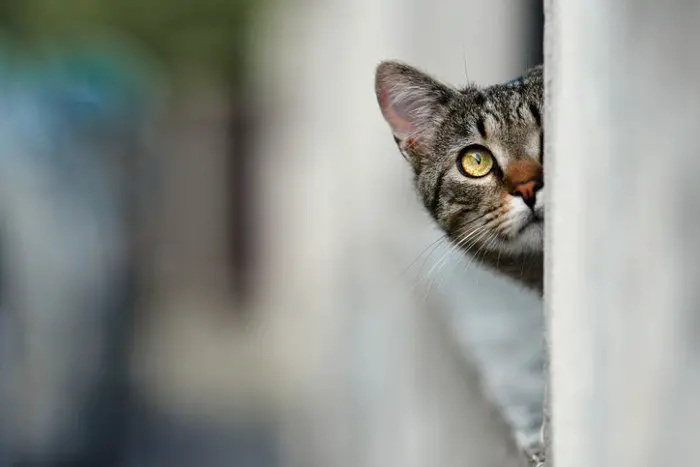
Fortunately, with some patience and the expert advice of a training program you will be able to put a stop to this unwanted behaviour.
It can be challenging to identify the reason your cat is spraying, if none of the above solutions are helping your cat then a training program will be able to look at the problem more thoroughly and put a stop to the undesired behaviour.
Cat Spraying Solution Summary
Working out why your cat is spraying can be a riddle (check out our article on cat riddles for help with those!) but once you figure it out, everything will fall into place. Remember that your cat is probably feeling stressed and that is why they are spraying so any negative reinforcement could worsen the situation.
Instead, do what you can to make your cat feel comfortable at home and take the necessary steps based on what you believe is causing the stress.
Be sure to rule out any health problems and if you’re really struggling, try using a cat training guide for extra support.
Don’t worry, we know it is frustrating now but soon spraying will be a distant memory for you both.
As an Amazon Associate I may earn a small fee from qualifying purchases at no extra cost to you. This helps us run the site, so thanks for your support!



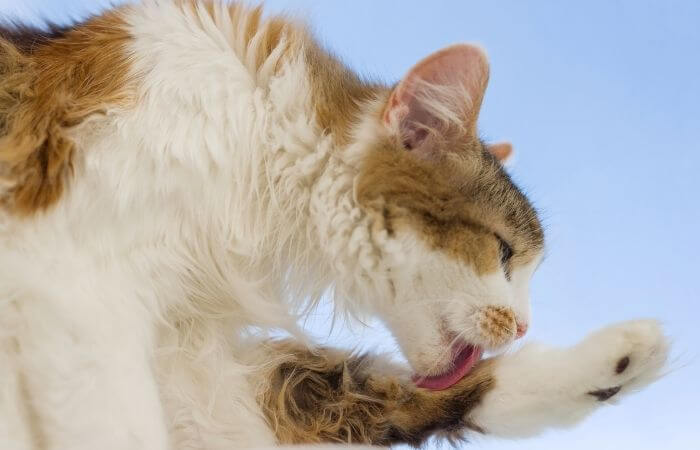


How to stop another cat coming through our cat flap and spraying all over the house
have you got a microchip cat flap? Check out our article on them here: https://www.tuxedo-cat.co.uk/microchip-cat-flaps/
This should stop stray cats getting in!